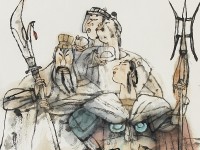Beauties and Heroes: Legends and Stories in Chinese Art
(from 21st Jan until 15th Jul 2012)Explore paintings, prints and papercuts depicting legendary figures from Chinese folklore.

The hermit Li Tieguai
-
Description
Huang Shen, also known as Yingpiao, was born in Ninghua, Fujian province but spent his adult life in Yangzhou, Jiangsu province as a professional painter. One of a group of painters known as the Eight Eccentrics of Yangzhou, Huang is especially noted for his rough, splashed ink technique and his application of cursive-script strokes in figure painting, both of which are evident here.
Li Tieguai, literally ‘Li with the Iron Crutch’, is one of the famous Eight Immortals in Chinese folklore. He is always depicted as a crippled beggar, with an iron walking stick in his hand, and a gourd-shape wine container at his waist. According to the story, Li was once a good-looking young man and successful Daoist practitioner who obtained immortality. One day his soul travelled out of his body to visit his teacher Laozi, but on his return seven days later he found the body destroyed. Li had no choice but to take over the body of a dying beggar. By depicting Li Tieguai, the artist illustrates images of both a popular immortal and a common beggar, a unique subject in Qing figure paintings.
-
Details
- Associated place
- Date
- 1757
- Artist/maker
-
Huang Shen (1687 - 1772) (artist)
- Material and technique
- ink and slight colour on paper
- Dimensions
-
mount 200 x 80.5 cm approx. (height x width)
painting 152.4 x 68.3 cm (height x width)
along roller 87 cm (length)
- Material index
- Technique index
- Object type index
- No. of items
- 1
- Credit line
- Purchased with the assistance of the Lady Cash Bequest, 1965.
- Accession no.
- EA1965.60
-
Further reading
Vainker, Shelagh, Chinese Paintings in the Ashmolean Museum, Oxford (Oxford: Ashmolean Museum, 2000), no. 53 on p. 75, illus. p. 74 fig. 53
Past Exhibition
see (1)Location
-
- currently in research collection
Objects are sometimes moved to a different location. Our object location data is usually updated on a monthly basis. Contact the Jameel Study Centre if you are planning to visit the museum to see a particular object on display, or would like to arrange an appointment to see an object in our reserve collections.
Publications online
-

Chinese Paintings in the Ashmolean Museum, Oxford
Huang Shen was born in Ninghua, Fujian province, where he spent his youth and the later part of his life. His middle years however were spent in the thriving city of Yangzhou in Jiangsu province, and he is among the painters known as the Eight Eccentrics of Yangzhou (Yangzhou baguai). His early, meticulous style gave way in maturity to a rough, splashed ink technique which proved highly lucrative in the prosperous mercantile environment of Yangzhou.
Notice
Objects from past exhibitions may have now returned to our stores or a lender. Click into an individual object record to confirm whether or not an object is currently on display. Our object location data is usually updated on a monthly basis, so please contact the Jameel Study Centre if you are planning to visit the museum to see a particular Eastern Art object.
© 2013 University of Oxford - Ashmolean Museum


